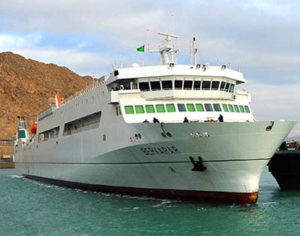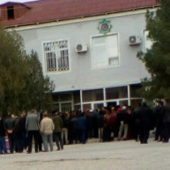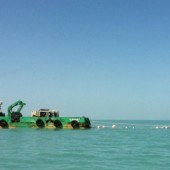 At Turkmenbashi, Turkmenistan’s main port on the Caspian Sea, thousands of people await to board the ferry to Baku, Azerbaijan, across the sea. The new Turkmenbashi seaport was launched in May this year. In recent weeks it has experienced the largest-ever influx of passengers, even compared to the old port.
At Turkmenbashi, Turkmenistan’s main port on the Caspian Sea, thousands of people await to board the ferry to Baku, Azerbaijan, across the sea. The new Turkmenbashi seaport was launched in May this year. In recent weeks it has experienced the largest-ever influx of passengers, even compared to the old port.
People wait for several days at the port before they can board the ferry, which only departs to Baku a few times per week with no fixed schedule. Tickets are sold onboard at 160 manats ($10 at market rate) but due to a large number of people willing to buy it, access onto the board is possible only with a token. The tokens are given free of charge but people need to stand in long lines for several days to get them.
This is where intermediaries come into play: they sell the tokens to passengers at 500 manats ($31) – the price three times higher than the ferry ticket. Often some intermediaries take the money and never return with a token.
“Getting the token is nearly impossible! One has to wait three to five days spending the nights at the port. Intermediaries are often caught and arrested on the spot, but the business is so profitable that many keep trading tokens illegally. Almost half of the city is engaged in this business. This begs the question: instead of just focusing on catching these so-called traders, why not increase the cost of the ferry ticket to 300 manats and thus ensure that all the money goes into the state budget and not in the pockets of intermediaries? 300 manats would still be cheaper than 660 manats that we pay now,” a source said.
Turkmen passengers prefer sailing across the Caspian on the local Berkarar ferry, rather than on the Azerbaijani boat, because it is significantly cheaper. A ticket on the Azerbaijani ferry costs $60 and can only be paid in foreign currency.
Tension and anger are palpable among the people waiting at the port, according to sources. The obstacles to obtaining a pass for the ferry have frustrated the locals, who say they cannot just buy a ticket without standing in line and waiting for days.
Turkmens travel to Baku to find work or transit to Georgia and Turkey. Some try to remain in Azerbaijan as long as possible, even falling into gray, illegal status. There, women, officially hired at hairdressers, massage parlors, or restaurants, in fact, end up doing sex work.





